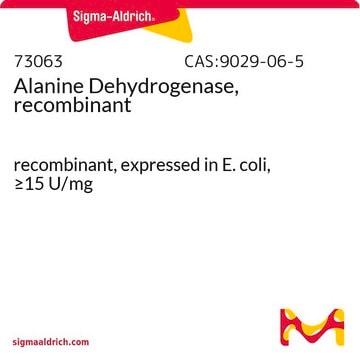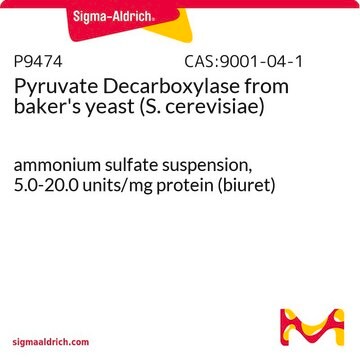A7653
L-Alanine Dehydrogenase from Bacillus subtilis
buffered aqueous glycerol solution, ~30 units/mg protein (Lowry)
Synonyme(s) :
L-Alanine: NAD+ oxidoreductase (deaminating)
About This Item
Produits recommandés
Source biologique
Bacillus subtilis
Niveau de qualité
Forme
buffered aqueous glycerol solution
Activité spécifique
~30 units/mg protein (Lowry)
Activité étrangère
LDH ~1% (using pyruvate as substrate)
Température de stockage
−20°C
Vous recherchez des produits similaires ? Visite Guide de comparaison des produits
Application
Actions biochimiques/physiologiques
Définition de l'unité
Forme physique
Mention d'avertissement
Danger
Mentions de danger
Conseils de prudence
Classification des risques
Resp. Sens. 1
Code de la classe de stockage
10 - Combustible liquids
Classe de danger pour l'eau (WGK)
WGK 3
Équipement de protection individuelle
Eyeshields, Gloves, multi-purpose combination respirator cartridge (US)
Certificats d'analyse (COA)
Recherchez un Certificats d'analyse (COA) en saisissant le numéro de lot du produit. Les numéros de lot figurent sur l'étiquette du produit après les mots "Lot" ou "Batch".
Déjà en possession de ce produit ?
Retrouvez la documentation relative aux produits que vous avez récemment achetés dans la Bibliothèque de documents.
Notre équipe de scientifiques dispose d'une expérience dans tous les secteurs de la recherche, notamment en sciences de la vie, science des matériaux, synthèse chimique, chromatographie, analyse et dans de nombreux autres domaines..
Contacter notre Service technique








